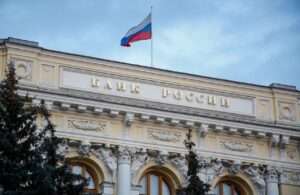The Volokh Conspiracy
Mostly law professors | Sometimes contrarian | Often libertarian | Always independent
European Nations Again Consider Using Frozen Russian State Assets to Fund Ukraine's War Effort
Over $300 billion in Russian state assets are frozen in the West. It's long past time they were used to help Ukraine resist Vladimir Putin's war of aggression.

European Union nations are once again considering ways to use the $300 billion Russian state assets frozen in Western nations (mostly in Europe) to help Ukraine:
European Union leaders on Wednesday weighed a new scheme to provide longer-term financial and military support to Ukraine using hundreds of billions of dollars in frozen Russian assets held in Europe.
The plan — which Moscow has described as "theft" — is a fresh sign of the EU's determination to push ahead alone with support for Ukraine without the United States. Under President Donald Trump the U.S. no longer sends financial aid to Ukraine, and little so far in the way of weapons.
Ukraine's budget and military needs for 2026 and 2027 are estimated to total around 130 billion euros ($153 billion). The EU has already poured in 174 billion euros since the war started in February 2022.
The biggest pot of ready funds available is through frozen Russian assets. Most of it is held in Belgium – around 194 billion euros as of June – and outside the EU in Japan, with around $50 billion, and the U.S., U.K. and Canada with lesser amounts.
The plan currently under consideration would use the funds to back a loan that Ukraine would only have to repay if Russia pays an equivalent amount in war reparations. I have long advocated just simply confiscating the Russian state assets and giving them to Ukraine (e.g. here, here, and here). But the EU loan plan is almost as good, inasmuch as the practical effects are likely to be very similar. Unless Russia pays reparations (which seems unlikely), the confiscated state assets will ultimately be used to repay the loan, and Ukraine will not be held liable for it.
Last year, Congress enacted the REPO Act, which authorized the president to confiscate the approximately $6 billion in Russian state assets frozen in the US and transfer them to Ukraine. But neither Biden nor Trump has acted on it. In recent weeks, Trump has been rhetorically tougher on Russia than before, but I am not optimistic that these words will be backed by deeds. He can start to prove me wrong by using the REPO Act authority.
In a November 2023 post, I addressed a range of different objections to confiscating Russian state assets, including 1) claims that it would violate property rights protections in the US and various European constitutions, 2) sovereign immunity arguments, 3) arguments that it would be unfair to the Russian people, 4) slippery slope concerns, and 5) the danger of Russian retaliation. Every point made there remains relevant today. Stephen Rademaker, former chief counsel to the House Committee on Foreign Affairs, has a helpful recent Washington Post article further addressing the retaliation point.


Show Comments (40)